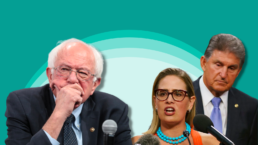“It is a sad day when two members of the Democratic Caucus are prepared to allow the Freedom to Vote Act to fail and undermine the future of American democracy.”
By Jake Johnson, Common Dreams
Sen. Bernie Sanders said Friday that by vowing to uphold the archaic Senate rule standing in the way of voting rights legislation, his colleagues Joe Manchin and Kyrsten Sinema are putting “the future of American democracy” at risk.
“It is a sad day when two members of the Democratic caucus are prepared to allow the Freedom to Vote Act to fail,” the Vermont senator tweeted. “I hope very much they will reconsider their positions.”
Sinema (D-Ariz.) and Manchin’s (D-W.Va.) opposition to weakening the 60-vote filibuster rule—a stance they reiterated Thursday—effectively tanks their party’s hopes of passing voting rights legislation to thwart the GOP’s mass disenfranchisement and election subversion efforts in states across the country.

Despite the likelihood of failure, Majority Leader Chuck Schumer (D-NY.) said the Senate will debate the newly assembled Freedom to Vote: John R. Lewis Act on Tuesday, a day after the federal holiday honoring Martin Luther King Jr.
“If Senate Republicans choose obstruction over protecting the sacred right to vote—as we expect them to—the Senate will consider and vote on changing the Senate rules, as has been done many times before, to allow for passage of voting rights legislation,” Schumer said in a floor speech after Sinema made clear she would not back any such changes, intensifying calls for a 2024 primary challenge.
The support of every member of the Senate Democratic caucus and a tie-breaking vote from Vice President Kamala Harris would be needed to enact a rule change.
With federal action likely not forthcoming, local Democratic officials and activists “now say they are resigned to having to spend and organize their way around” the slew of fresh Republican-authored voting restrictions, the New York Times reported, “a prospect many view with hard-earned skepticism.”
In a July letter to President Joe Biden, a coalition of 150 civil rights organizations wrote that “while we support the notion of a broad-based coalition of advocates, we cannot and should not have to organize our way out of the attacks and restrictions on voting that lawmakers are passing and proposing at the state level.”
“Nor can we litigate our way out of this threat to democracy,” the groups warned. “We must remember that at critical times in our history, one party has been forced to act alone in securing the fundamental democratic rights of American citizens, including Congress’ passage of both the 14th and 15th Amendments. Any rule or procedure that functions to stop bills from ever being considered on the floor is not a procedure to promote debate; it is a procedure to promote gridlock.”
Recent Posts
‘Unconstitutional. Unethical. Authoritarian.’ ICE Bars Millions Of Immigrants From Bond Hearings
July 18, 2025
Take Action Now One watchdog said the new policy “seems like a blatant attempt to stop them from exercising their right to due process.”……
Americans Are Not Nearly Alarmed Enough About Climate Change
July 18, 2025
Take Action Now Americans still don’t comprehend how imminent, dangerous, and far-reaching the threat is—and journalists are partly to blame.By…
The IRS Is Building A Vast System To Share Millions Of Taxpayers’ Data With ICE
July 17, 2025
Take Action Now ProPublica has obtained the blueprint for the Trump administration’s unprecedented plan to turn over IRS records to Homeland Security…
Israel’s Sudden Assault On Syria Is Unchecked Aggression
July 17, 2025
Take Action Now Jerusalem is bombing Damascus and threatening al-Sharaa’s rule, while Washington was hoping to help the nascent government on…




